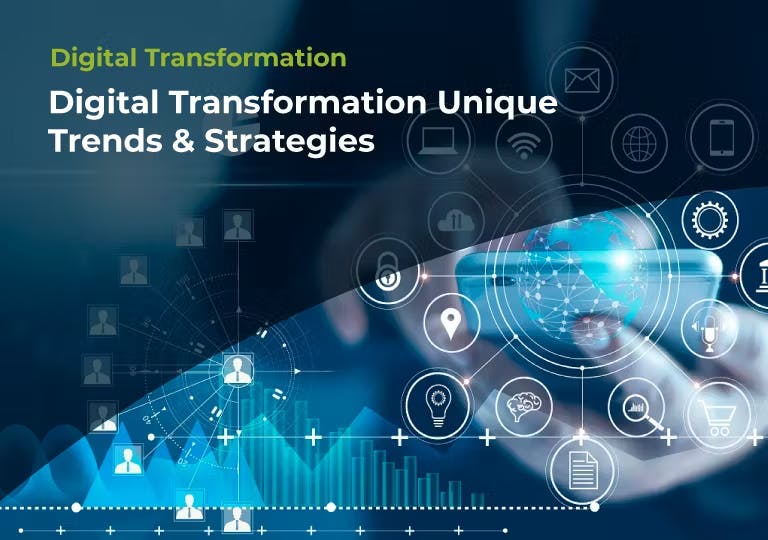Digital Transformation Unique Trends & Strategies


The Covid-19 pandemic accelerated the adoption of digital tools. The turn of events during the pandemic led customers to shift more towards using online channels. In no time, C-level executives had to alter the way they conducted business operations and interacted with customers. To maintain a competitive edge in the business and economic environment, companies had to adopt digital transformation strategies and practices that would align with the customers' shift towards digitalization. For many companies, the new normal involved the revolutionization of business processes and models. From the emergence of remote work to customer-friendly mobile apps, advanced e-commerce platforms, and many more digital transformations, the Covid-19 pandemic dispelled the doubts of leaders and led to the rapid embrace of digital technologies. In essence, Forbes referred to 2020 as the 2025 digital acceleration timeline.
For many businesses, digital transformation forms the core of their growth strategy and operating model, while others are still catching up with the new digital trends. Through digital transformation, companies have the potential to improve efficiency, increase revenue, and enhance data-driven decisions. It's no surprise, then, that the digital transformation market is forecast to have a CAGR growth rate of 19.1% in the next five with a global spending of $6.8 trillion in 2023.
In this article, we'll explore the meaning of digital transformation and the trends in digital transformation.
What is Digital Transformation?
Digital transformation is the process of using digital technologies to improve business processes, business models, customer experiences, and organizational culture. It takes on a digital-first approach and integrates, AI, cloud computing, and automation, to enable insightful decision-making. According to McKinsey, digital transformation is different from business transformation. It is the rewiring of an organization's operations that involves the constant evolution and change of business operations to fit the market requirements.
Companies that strive to maintain a competitive edge in the industry leverage new technologies like machine learning, big data, Internet of Things (IoT) to meet customer expectations and fulfill business requirements. Inherent in digital transformation is the concept of agility, implying that companies should be adaptable to new technologies and changes. A good example of this adaptability was observed during the pandemic as companies made a swift transition to remote work and migrated from on-site data centers to hybrid or fully cloud-based infrastructures.
Digital transformation has been responsible for the evolution of technologies over the years till now. The move from an analog to a digitalized age. This transformation trend is a new opportunity for companies to undertake business activities differently with the use of technology and to build solutions with technology-inclined tools.
There are two concepts that are associated with digital transformation — digitization and digitalization.
Digitization
In the past, businesses maintained their records manually, either through handwriting on paper or typing into documents. When information was needed, they had to sort through physical files and folders. However, in recent times, there has been a shift from manual documentation to digital forms. This process of converting analog information into digital information is known as digitization.
Digitalization
On the other hand, digitalization refers to how organizations enhance efficiency and work smarter through the use of digital technologies. It involves the use of software tools to improve workflow and accelerate the launch speed of digital products.
The Top Digital Transformation Trends
Artificial Intelligence (AI) & Machine Learning (ML)
In the last few months, there has been a skyrocketing increase in the downloads and use of ChatGPT, an AI-powered language processing technology designed to converse and interact with humans or perform human-like tasks. In just five days, ChatGPT acquired 1 million users. In just 5 days, ChatGPT acquired 1 million users. Undeniably, AI holds great importance in digital transformation, serving as a force that helps companies analyze data and gain valuable insights from trends and patterns. Many industries stand to benefit from leveraging AI. For example, retail companies can use AI-powered chatbots to aid customer satisfaction and understand customer behavior. Additionally, smart data analytics can help improve personalized interactions between companies and customers, enhance workflow, and streamline costs. Indeed, the AI global market is forecasted to grow from $515.31 billion in 2023 to $2,025.12 billion by 2030.
Businesses are employing AI and machine learning (ML) to analyze vast and complex raw data more rapidly, deriving accurate results. In healthcare, AI is applied in radiology to generate medical imaging and improve accuracy. Without a doubt, AI and ML are transforming how businesses operate, uncovering deeper insights from data.
Migration to Cloud
Cloud migration can be referred to as a subset of digital transformation. It is considered a fundamental part of companies corporate digital transformation strategy. Cloud migration involves the transfer of data from physical data centers to cloud-based IT infrastructure. Businesses, especially Software-as-a-Service (SaaS) companies, have migrated to the cloud to enable effective and flexible data management. Instead of spending time and resources on updating systems, developing new codes, and deploying software on desktops, cloud computing facilitates a faster and more secure migration of software to the cloud, ensuring cybersecurity and scalability. With this transition, companies can now focus more on their core business objectives. Mckinsey reports that by 2024 the average company will spend about 80% of their IT budget to cloud migration.
Before migrating to the cloud, there are fundamental questions that should be considered. Companies need to decide whether a public, private, or hybrid cloud infrastructure is most suitable for their needs and whether they have mitigation and risk plans in place in case of any failure or setback. This is why the expertise of a cloud computing specialist is crucial to enable a smooth migration to the cloud without hitches. Devsu has a wide range of cloud computing experts that help businesses with cloud computing.
Automation & DevOps
Automation and DevOps play pivotal roles in digital transformation. They represent new ways for companies to implement processes and systems, freeing up employee time, improving workflows, and reducing errors. A company may automate its processes but still not fully benefit from the entirety of DevOps.
Automation and DevOps combine software development and operational processes. With DevOps, teams collaborate more effectively and become highly efficient. Salesforce reports that 95% of IT and engineering leaders prioritize workflow automation as it reduces data silos and enhances customer experiences. For instance, Robotic Process Automation (RPA) enables the automation of repetitive administrative tasks.
As a constantly evolving process, the trends in automation and DevOps within digital transformation help companies innovate and implement new ideas while maintaining and improving existing ones.
Blockchain
Blockchain is a distributed digital ledger of transactions, securely maintained by a network of computer systems. It's a vital part of digital transformation that facilitates seamless workflow experiences in businesses, including credit reporting and Know Your Customer (KYC) procedures. By digitalizing these transactions, businesses can save time and effort that would otherwise be spent waiting for third-party institutions or preparing paper documents. The use of blockchain technology eliminates payment and transfer barriers, making business operations less cumbersome.
The Use of Low-code No
Low-code is a method that employs visual techniques to develop software applications. It enables businesses to create software solutions faster and without extensive coding. As a trend in digital transformation, low-code is seeing a gradual increase in adoption due to its speed and minimal time requirements compared to traditional coding methods. Low-code aims to boost company productivity and efficiency. The use of low-code reduces the time it takes for businesses to build digital solutions by about 90%. In a low-code setup, both developers and non-developers can utilize drag-and-drop functionality to develop digital applications on the go. In this way, companies can keep innovating and creating functional prototypes.
As the world technologically evolves, the demand for mobile applications is five times higher than the capacity of IT. Therefore, a lack of technical talent can pose a setback to a company's digital transformation. Many businesses struggle to find the right tech talent to help deliver quality software solutions and meet customer expectations. Low-code can assist companies in reducing backlogs and increasing the speed of their development teams. More importantly, staff augmentation is an ideal solution for companies seeking to increase their speed to market.
Low-code as a trend in digital transformation means that businesses can develop software more quickly. Moreover, expert software developers can provide input into the software solutions to enhance the final products for customers. This leads to higher quality solutions that align with business goals.
Reflecting on these digital transformation trends will provide insight into what to expect in the future and where your company stands in the economic environment. Although we have listed several trends above, it is up to your organization to determine what needs to be adopted to stay ahead in the market and what areas require updates in your business operations and processes. From artificial intelligence to machine learning, automation and DevOps, to cloud computing, there are various ways to participate in digital transformation and develop strategies that can keep your organization ahead. Importantly, hiring the right people to implement these various digital transformation trends into your business can save costs and increase speed. At Devsu, we specialize in helping companies transform their businesses. Find out how we can contribute to your business success.
Subscribe to our newsletter
Stay informed with the latest insights and trends in the industry
You may also like


